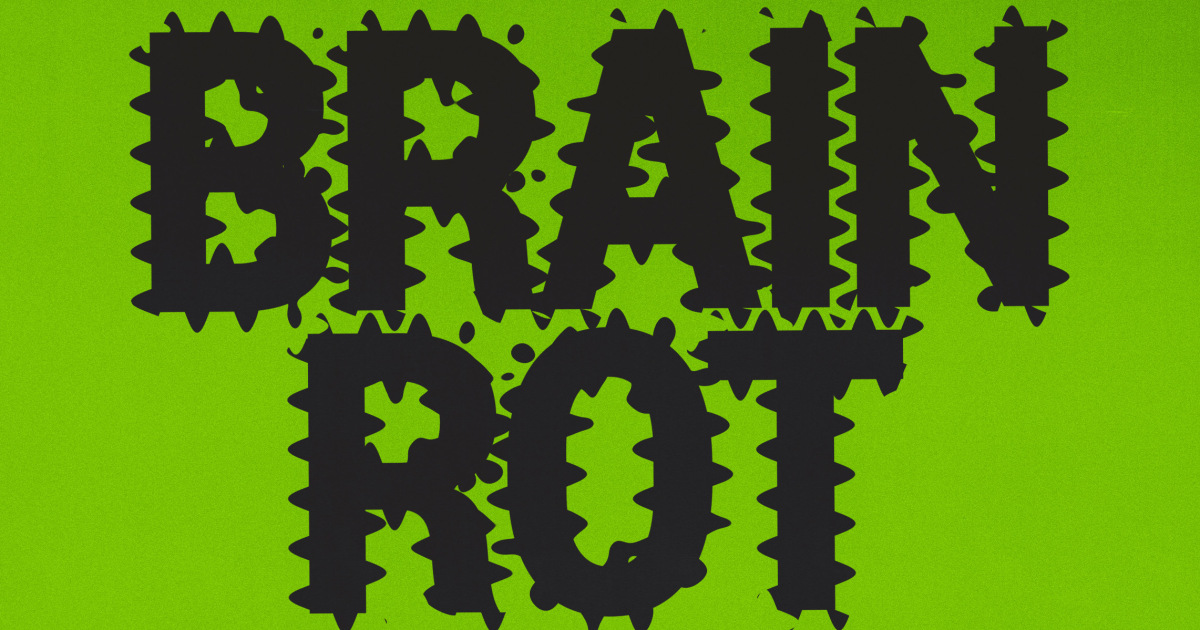In an age defined by information overload and constant digital stimulation, the term “brain rot” has emerged as a strikingly evocative description of the cognitive fatigue experienced by many in society today. This year, Oxford University Press selected “brain rot” as its Word of the Year, igniting a debate about the implications of this phrase in the context of modern discourse, mental health, and the pervasive influence of digital media. As digital platforms continue to saturate our lives, the term symbolizes not just an individual struggle but a collective societal concern.
The Rise of “Brain Rot” in the Digital Era
Oxford’s choice of “brain rot” as the Word of the Year has sparked considerable discussion, drawing attention to the increasing challenges posed by the digital age. The term evokes imagery of cognitive decline, an almost metaphorical decay of the mind, attributed to prolonged exposure to the chaotic, fast-paced nature of online content. It is a product of the internet age, where information is incessantly streamed through platforms that prioritize brevity over depth and sensationalism over substance.
As we delve deeper into this concept, it is crucial to understand the psychological and neurological implications behind it. “Brain rot” is not just a casual metaphor but a reflection of real cognitive strain. Recent studies have shown that excessive screen time, especially on social media, is linked to declines in attention span, difficulty processing complex information, and even changes in brain structure. A growing body of research indicates that the overstimulation caused by constant notifications, updates, and the relentless demand for instant gratification can diminish the brain’s ability to focus on meaningful tasks.
The Impact of Information Overload
Information overload is one of the primary contributors to “brain rot.” In a world where we are bombarded with thousands of pieces of content every day, from news articles to viral memes and influencer posts, our cognitive resources become stretched thin. Research conducted by Stanford University suggests that multitasking, a common behavior in the digital world, can reduce our ability to think critically, leading to cognitive fatigue and reduced decision-making capacity.
- Attention deficit: The average person checks their phone every 12 minutes, leading to chronic interruptions that fragment our attention span.
- Reduced deep thinking: Short-form content, such as TikTok videos or Twitter threads, often lacks the depth needed to engage in meaningful contemplation.
- Emotional fatigue: Constant exposure to distressing news can lead to emotional burnout and desensitization.
This relentless flow of information can result in a phenomenon known as “cognitive overload,” where the brain struggles to keep up with the pace of incoming stimuli. This, in turn, can lead to a sense of mental exhaustion, or “brain rot,” where even simple tasks feel daunting.
The Role of Social Media in Cognitive Decline
Social media platforms, which have become central to how we communicate, consume news, and entertain ourselves, are at the forefront of the “brain rot” discussion. These platforms are designed to be highly engaging and to keep users hooked for extended periods. The use of algorithms that personalize content based on our browsing history and preferences ensures that we are constantly fed content that triggers dopamine responses, reinforcing a cycle of addiction.
Studies have shown that excessive use of social media can lead to heightened levels of anxiety, depression, and a reduced sense of self-worth, all of which contribute to the cognitive overload associated with “brain rot.” The pressure to stay connected and engaged with others, coupled with the fear of missing out (FOMO), can also exacerbate these issues. Users often find themselves scrolling mindlessly through content, consuming information at a rapid pace without fully processing it, which diminishes their capacity for deep thinking and reflection.
Effects on Mental Health
The psychological effects of social media are profound, with numerous studies indicating that prolonged exposure to digital environments can worsen mental health conditions. A 2021 study published in the National Institutes of Health revealed that excessive social media use correlates with increased feelings of loneliness, anxiety, and depression. These emotional states can further degrade cognitive function, leading to the spiral of “brain rot.”
- Social comparison: The curated nature of social media fosters unhealthy comparisons, leading to feelings of inadequacy.
- Reduced attention span: The constant novelty of social media undermines the ability to engage with longer, more complex content.
- Sleep disturbances: Blue light emitted by screens interferes with sleep cycles, contributing to mental fatigue.
The Broadening Implications of “Brain Rot”
While the term “brain rot” initially appears to be a critique of individual behavior, it also reflects broader societal trends. The global shift toward digitalization has transformed how we interact with information, leading to widespread concerns about the future of education, communication, and even democracy. As we become more reliant on digital platforms, there are growing fears about the erosion of critical thinking skills and the rise of misinformation.
The Dangers of Misinformation
One of the most dangerous consequences of “brain rot” is its potential to fuel the spread of misinformation. In an environment where sensational headlines and clickbait dominate, users may find themselves more susceptible to believing false or misleading information. The cognitive fatigue caused by constant exposure to unverified content can lead to a decrease in skepticism, leaving individuals more prone to accepting claims without critical evaluation.
The ultimate challenge lies in balancing the advantages of digital connectivity with the risks of cognitive overload. In this context, media literacy becomes an essential skill, enabling individuals to navigate the complex landscape of digital information and discern between fact and fiction.
The Role of Education and Media Literacy
As the phenomenon of “brain rot” grows more prevalent, the need for better education and media literacy has become urgent. Schools and universities must integrate digital literacy into their curricula, teaching students not just how to consume information but also how to critically assess it. Media literacy programs can help people develop the skills necessary to avoid cognitive overload and maintain their mental well-being in an increasingly digital world.
Moreover, individuals must take personal responsibility for managing their digital consumption. Setting boundaries, such as limiting screen time or taking digital detoxes, can help mitigate the cognitive strain associated with excessive online engagement. Simple practices, like reading long-form articles or engaging in face-to-face conversations, can also foster deeper thinking and reduce the detrimental effects of “brain rot.”
Conclusion: Navigating the Digital Landscape
Oxford’s selection of “brain rot” as the Word of the Year is a powerful reminder of the challenges we face in the digital age. As we continue to navigate an environment filled with constant distractions and overwhelming amounts of information, it is essential to recognize the toll it takes on our cognitive health. While the internet offers unparalleled access to knowledge and connections, it also requires careful management to avoid the mental fatigue that “brain rot” symbolizes.
Ultimately, addressing this issue involves a multifaceted approach—individuals must cultivate self-awareness about their digital habits, educators must equip future generations with the tools to think critically in an information-saturated world, and policymakers must consider the societal implications of digital overexposure. By taking these steps, we can begin to reverse the effects of “brain rot” and foster a healthier, more mindful relationship with the digital world.
For more insights into the effects of technology on mental health, visit Psychology Today.
See more TED Talks World



